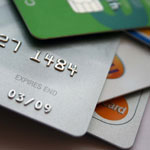My Financial Implosion: Credit After Bankruptcy
 ‘œIt is only the poor who pay cash, and that not from virtue, but because they are refused credit.’ ‘“ Anatole France
‘œIt is only the poor who pay cash, and that not from virtue, but because they are refused credit.’ ‘“ Anatole France
After my bankruptcy was discharged in January of 1998, I had one very important question on my mind: How do I rebuild my credit? It was very important to me to rebuild my credit rating and get back to normal life, whatever that looked like. Having good credit is important in many aspects of life, so I wanted to make things better as quickly as possible.
In my own experiences with bankruptcy, I’ve learned that there are actually two schools of thought for post-bankruptcy recovery:
- Avoid credit like the plague ‘“ once you’ve developed a taste for credit, it’s hard to avoid being sucked in again, and you won’t be able to file bankruptcy for another seven years.
- Establish credit immediately ‘“ rebuild your credit rating as quickly as possible.
Although I certainly saw the wisdom in the former, I knew that for many of the goals I had in mind, re-establishing credit was going to be important. I traveled, which meant I needed a credit card. I also wanted, at some point, to return to home ownership, which would require a mortgage.
Although it’s possible to bounce back quickly after bankruptcy, it’s important to remember that the terms most credit issuers will offer will be less than stellar. Don’t be desperate or in a hurry, because it makes you a target to be ripped off. There are plenty of credit issuers who will be delighted to separate you from your money in the form of high interest rates, service fees, and other fine print.
If you want to re-establish your credit, here are a few things that can help:
1. Clean up your credit report. Although you won’t be able to legally remove your bankruptcy from your credit file, it’s wise to check that there aren’t any additional errors. My credit file erroneously reported a number of accounts as still open and unpaid, which drug my credit score down even further. I disputed the incorrect entries, provided the credit bureau with the relevant pages of my bankruptcy filing, and had the listings changed to ‘œincluded in bankruptcy.’
2. Learn from your mistakes and don’t repeat them. Take a good hard look at why you declared bankruptcy in the first place, and do better. Spend less than you earn, create an emergency fund, and make sure you are insured against future disasters.
3. Apply for a secured credit card, but do it carefully. Although there are myriad credit card issuers who are happy to give credit cards to the recently bankrupt, the majority of them demand high interest rates, high fees, and ridiculous terms. Don’t apply for cards that require up-front application fees or monthly maintenance fees. You’ll also want to avoid cards that don’t offer any grace period and begin charging interest from the second you make a purchase. Make sure that the card reports to the major credit bureaus, and that there’s a path to change the card to an unsecured card after you’ve proven yourself. Often, credit unions can be a big help in this area, but make sure you read all the fine print, and don’t accept a deal unless the terms are reasonable.
4. If you can’t get a secured card on your own, and your partner has good credit, look into being added as an authorized user. This option should be used carefully, as it can be fraught with problems in the event of a breakup. Remember that debts sometimes last longer than love, so be careful.
5. Pay your bills on time. Once you have filed bankruptcy, any negative payment information only further worsens your situation. Do not incur debts you cannot afford, and make sure you make all your payments on time. Some shady lenders will sneakily change your payment due dates to try and hit you with late fees, so pay attention. Use your credit cards, sparingly, every month and establish a good track record.
6. Don’t be in a big hurry to incur more debt, especially when it comes to big-ticket items like automobiles. Although it’s possible to buy a car after you’ve filed bankruptcy, it’s better to wait until your scores improve over time. I let myself get in a hurry and ended up ripped off by a used car dealer. Take your time, check with multiple lenders including your local credit union, and drive your klunker until you can afford to pay cash, or at least make a large down payment.
7. Patience and research are important. There are some lenders, especially store credit cards, who won’t give you a card if you have a prior bankruptcy on your credit report. Ask about a lender’s policies before you apply and save yourself the inquiry on your credit report and the embarrassment of being turned down.
There is credit after bankruptcy, but it costs more, a lot more, and you need to be prepared for that fact.
Next in Series: Finding Housing with Bad Credit
Photo Credit: stock.xchng


Great advice, Alex, even for people who haven’t declared bankruptcy.
Alex: Excellent ideas. Paying your bills on time is such an important part of the equation. For those that struggle, they should pay online and set up as many automatic payments as possible. Being organized is key, in my opinion.